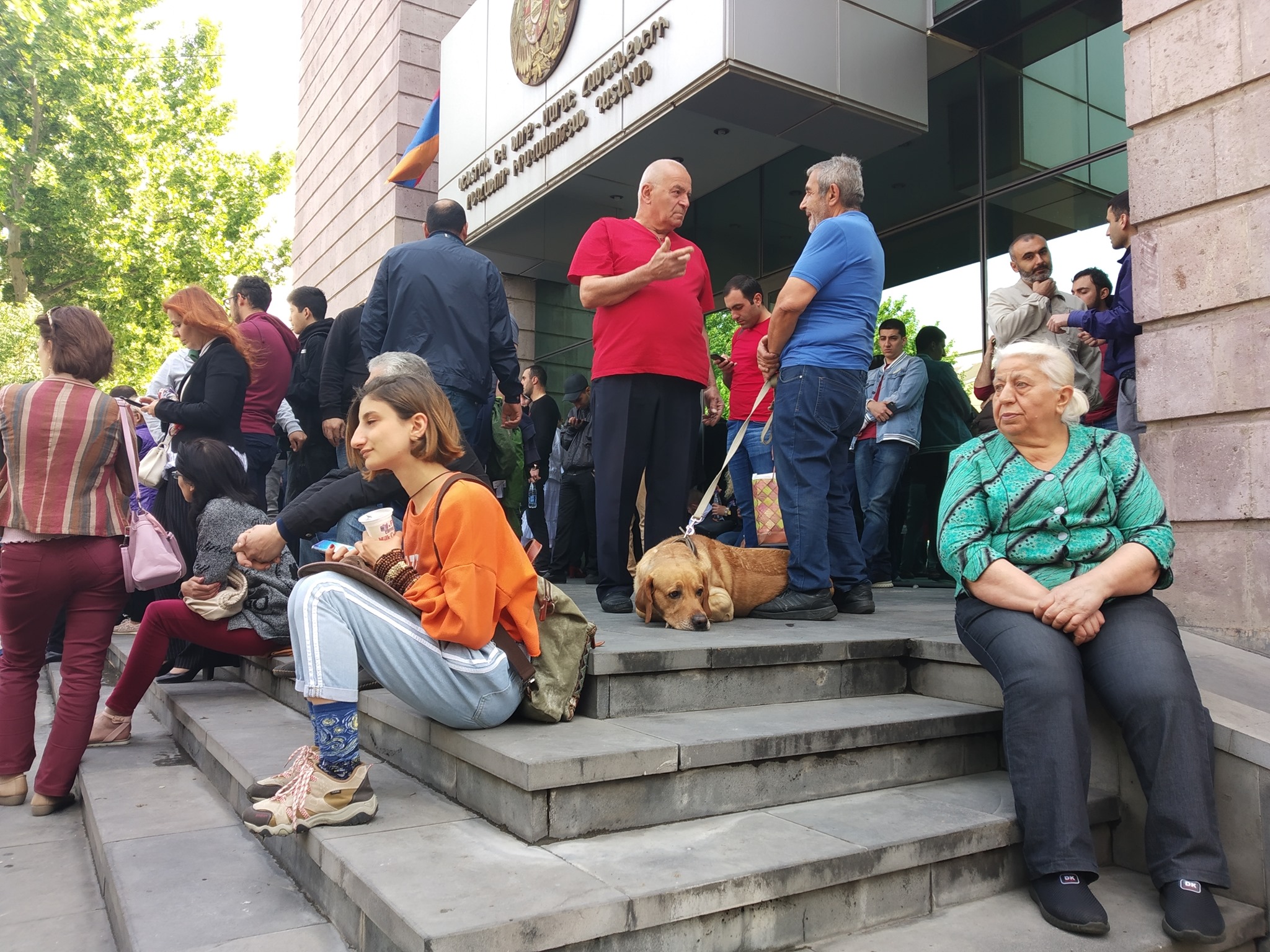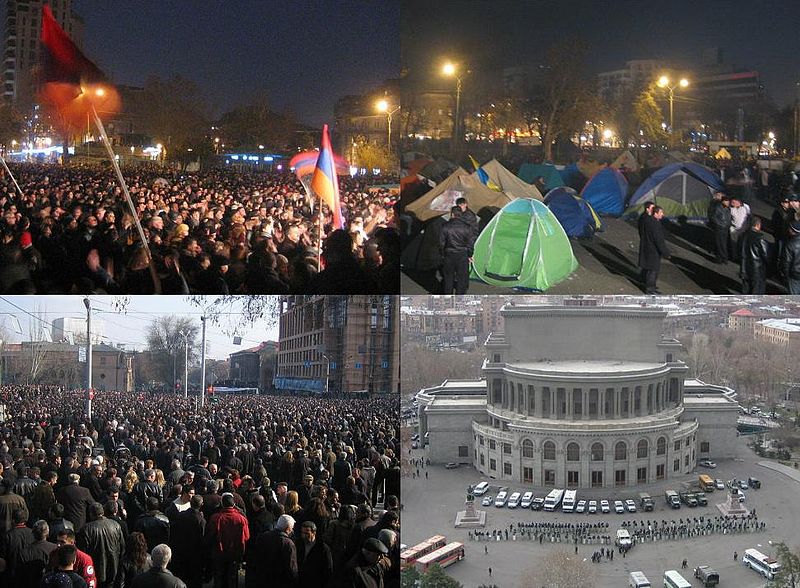
Protesters gathered outside courts across Armenia on Monday after Prime Minister Nikol Pashinyan called for supporters to block the entrances, describing the courts as ‘puppets’ of the former government.
Pashinyan made the request in a live Facebook address on Sunday evening, calling it the ‘second most important stage of the Armenian revolution’.
In a televised speech during Monday’s cabinet meeting, Pashinyan said it was time for a ‘surgical intervention’ in the country's judicial system and the beginning of ‘transitional justice’.
While Pashinyan did not refer to any specific verdict, he said that it was evident ‘the rulings of the courts are deeply untrustworthy’ and that they were perceived as being a ‘leftover of the former corrupt regime’.
The move came a day after the Yerevan City Court released former president Robert Kocharyan, a longtime political foe, on bail.
Pashinyan also berated unidentified opponents in Nagorno-Karabakh. The court freed Kocharyan after former and acting presidents of Nagorno-Karabakh, Arkady Ghukasyan and Bako Sahakyan respectively, personally vouched for him and each deposited ֏500,000 ($1,000) bail.
Pashinyan further elaborated that because the judiciary ‘did not enjoy the people’s trust’, it was illegitimate, and was ‘becoming a direct threat to the stability and national security of our country’.
Pashinyan promised five steps to ‘regain people’s trust’ in the courts, including that all judges must undergo vetting so that the public gains comprehensive knowledge about the origin and political ties of all judges.
He promised that judges whose decisions contained significant violations of human rights according to ECHR rulings must resign or be fired, as should those judges who know ‘they are incapable of being impartial’.
He promised to complete the process of ‘transitional justice’ within two to three months, and did not rule out amending the constitution ‘if necessary’.
‘Ties to the old regime’
Robert Kocharyan, who served as the second President of Armenia in 1998–2008 and as the first president of Nagorno-Karabakh in 1994–1997 is currently facing charges of overthrowing the constitutional order, over the violent dispersal on protesters in 2008.
Kocharyan’s case, along with that of former officials Armen Gevorgyan, Seyran Ohanyan, and Yuri Khachaturov, has now been transferred to the Constitutional Court, Armtimes cited Ohanyan’s lawyer as saying on Monday. The prosecutor's office told Armtimes that they had ‘no such information’.
In a post on Facebook, Vahe Grigoryan, a lawyer representing victims of the 2008 violence, said he had not been informed of the move.
Grigoryan also told RFE/RL that he and his colleagues were not allowed to participate in the hearing of the motion to release Kocharyan on bail.
Kocharyan was an ally of former Prime Minister Serzh Sargsyan, who Pashinyan ousted through popular anti-government protests in the spring of 2018, a process he dubbed a ‘Velvet Revolution’.

Before his speech outlining his plans for the judiciary, Pashinyan visited supporters protesting outside the Kentron Court in Yerevan. By this time, courts throughout Armenia including the Supreme Judicial Council and the Constitutional Court had been paralysed. Several MPs from the ruling My Step parliamentary group also joined the protests.
After his speech on Monday, Pashinyan called off the blockade of the courthouses, suggesting a message of distrust towards the courts had been delivered. He said the pursuit of an independent judiciary in Armenia was now irreversible now.
Warnings of ‘populism’
The Supreme Judicial Council quickly responded Sunday evening with a statement calling the plans to disrupt the functioning of the courts ‘inadmissible’.
A number of political groups and public officials, including the largest opposition parliamentary party, Prosperous Armenia, rebuked Pashinyan for his call to block court buildings.
Armenia’s Human Rights Defender Arman Tatoyan said in a statement late on Sunday that the call to blockade courthouses was ‘highly dangerous for the security and stability of the country’s legal system’.
On Monday, Bright Armenia, an opposition party that won 18 seats in the 2018 snap parliamentary elections, announced they would convene an extraordinary session in the National Assembly to discuss Pashinyan’s latest steps.
Armenian president Armen Sarkissian also stepped into the fray on Sunday, calling on compatriots to show restraint and respect the country’s constitution.
Since he was first appointed Prime Minister in May 2018, Pashinyan has on one other occasion resorted to reigniting street protests against what he referred to as the ‘old regime’ and ‘counterrevolution’.
Facing resistance from opponents in the National Assembly to move forward with snap parliamentary elections in October 2018, he mobilised supporters and paralysed the legislative body, forcing the Armenian Republican Party to succumb.
Nate Schenkkan, from international rights group Freedom House, labelled Pashinyan’s latest steps as ‘populist’.
The danger in post-revolutionary Armenia was always that Pashinyan, lacking the ability to transform the country quickly or sustainably, would fall back on the populism that got him into power. Here we are.
— Nate Schenkkan (@nateschenkkan) May 19, 2019
In a statement to Armenian news site Aysor on 20 May, the US Embassy in Armenia said that the strengthening an independent judiciary, which includes anti-corruption efforts and the establishment of the rule-of-law institutions, ‘required a long-term strategy for building transparent and accountable institutions with determination, vigilance and governance’.
They encouraged Pashinyan’s government ‘to pursue judicial reform in a manner commensurate with the Armenian Constitution’.
Kocharyan and Nagorno-Karabakh
As a war veteran and former leader of Nagorno-Karabakh, Kocharyan is considered to have strong ties with the political and military elite in Stepanakert.
Rifts between Pashinyan and the leadership in Stepanakert became apparent in late 2018 when Nagorno-Karabakh’s Defence Minister, Senor Hasratyan, scolded Pashinyan ally Sasun Mikaelyan for suggesting the Velvet Revolution was a bigger moment for Armenians than victory with Azerbaijan over Nagorno-Karabakh.
Pashinyan hit back soon after, eventually accusing Nagorno-Karabakh’s leadership of interfering in the ongoing election campaign in December.
Kocharyan and his allies have been critical of Pashinyan over his insistence last year on including Stepanakert in peace talks with Azerbaijan accompanied by no direct talks between Armenia and Azerbaijan.
In the same August 2018 interview, Kocharyan indicated it was a mistake to disengage from the negotiation process, and also characterised Pashinyan and his government as an inexperienced team coming from non-governmental organisations financed by George Soros, and ‘possibly’ even with Turkish and Azerbaijani funds.
In a speech on 20 May, Pashinyan was unprecedented in his open denouncement of ‘powers’ in Nagorno-Karabakh that ‘aimed to seed contradictions between the two sides of the [Armenian] nation’, a common reference to Armenians in Nagorno-Karabakh and Armenia.
He did not rule out that the ‘previous corrupt system’ might incite conflict with Azerbaijan and surrendering territories to them in order to blame his government later.
The formerly ruling Armenian Republican Party called Pashinyan’s ‘allegations of betrayal and conspiracy towards the government of Artsakh [Nagorno-Karabakh]’: ‘extremely dangerous’.
Pashinyan accused certain people not supporting him in Nagorno-Karabakh, without identifying who, of ‘using Artsakh’s people for their narrow group interests’.
‘Overthrowing the constitutional order’
Yerevan City Court granted Robert Kocharyan bail after five-months in pre-trial detention after the intervention of former and acting presidents of Nagorno-Karabakh.
Kocharyan was freed on 18 May as rallies of supporters and critics faced off outside the court.
Armenia’s Special Investigative Service charged the former president in July 2018 for breaching the constitution, accusing him of giving a clandestine order to ‘involve the army into a political process’ by having them assist the dispersal of 2008 anti-government protestors.
Protests erupted in February 2008 after an ally of then president Kocharyan, Serzh Sargsyan, was declared the winner in contested presidential elections. The opposition led by Levon Ter-Petrosyan insisted the election results were rigged. In 10 days of protests peaking in the 1 March crackdown, eight civilians and two police officers were killed, and more than 200 people injured.

Pashinyan, an active supporter of Ter-Petrosyan, was among those imprisoned by authorities in 2010 for organising ‘violent’ rallies in 2008. He was sentenced to seven years in prison but was released in 2011 under an amnesty.
Kocharyan insisted he did not violate the constitution, and that the protests involved armed violence.
After being charged, he was remanded to two months in pre-trial custody but freed on bail less than three weeks later after an appeals court ruled his detention unlawful. His release from custody in August was also met with public outcry.
While unable to hold a press conference due to protests, he gave an interview to Armenian TV station Yerkir Media, announcing his political comeback, and calling the government under Pashinyan ‘incompetent’.
In December, he was rearrested and faced an additional indictment in February on charges of accepting a ֏927 million ($3 million) bribe in May 2008.
For ease of reading, we choose not to use qualifiers such as ‘de facto’, ‘unrecognised’, or ‘partially recognised’ when discussing institutions or political positions within Abkhazia, Nagorno-Karabakh, and South Ossetia. This does not imply a position on their status.




 20 May 2019
20 May 2019


